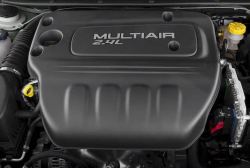— A Chrysler Tigershark engine lawsuit has been granted final approval after nine class action lawsuits were filed against the automaker.
According to the class action lawsuit, the 2.4L Tigershark engines can shut off while in motion due to problems with excessive oil consumption.
The Tigershark lawsuit settlement includes these Fiat Chrysler (FCA) vehicles.
- 2015-2017 Chrysler 200
- 2013-2016 Dodge Dart
- 2014-2019 Jeep Cherokee (manufactured prior to July 2018)
- 2015-2018 Jeep Renegade
- 2017-2018 Jeep Compass
- 2015-2018 Ram ProMaster City
- 2016-2018 Fiat 500x
The plaintiffs claim the Tigershark engines have multiple defects and dealer repairs don't help.
FCA says it decided to settle the class action lawsuit to put an end to the nine class actions that were consolidated into one, but the automaker denies all liability and wrongdoing.
The consolidated lawsuit includes these class actions:
- Krishawn Durham v. Fiat Chrysler Automobiles, N.V.
- Amber Wood, et al. v. FCA US LLC
- Nicolette Watson v. FCA US LLC
- Michelle Schmid, et al. v. FCA US LLC
- Kyle Davis, et al. v. FCA US LLC
- Nathanael Romanchuk, et al. v. FCA US LLC
- Nick Gizzarelli, et al. v. FCA US LLC
- Caren Christman v. FCA US LLC
- Thomas Weiner v. FCA US LLC
Chrysler Tigershark Class Action Lawsuit Settlement
According to the settlement agreement, customers may be eligible for a powertrain extended warranty which will extend the powertrain warranty to 7 years/100,000 miles.
However, the 7-year or 100,000-mile warranty begins from the date the vehicle was first used by the customer. This means for some owners of the older vehicles, the extended warranty had already expired before the class action settlement was final.
For customers who are eligible, the Tigershark powertrain extended warranty will cover expenses to repair oil consumption problems as long as the vehicle fails an oil consumption test performed by a dealership.
In addition, the vehicle must fail an oil consumption test after all customer service notification (CSN) programs have been performed on the vehicle.
Those include CSN W20, CSN W80, and CSN W84.
Customers may also qualify for reimursements for certain expenses related to Tigershark engines. However, there are conditions that must be met to receive reimbursements.
A vehicle owner can be reimbursed for money spent to tow a vehicle or for a rental car if the Tigershark engine was repaired for oil consumption issues. However, here are the conditions.
The rental car or towing services must have occurred within 24 hours of a qualifying repair performed due to oil consumption.
A completed repair-related expense reimbursement claim form must be submitted by the filing deadline which is 90 days after the settlement is final or March 1, 2023, whichever is later.
Customers will need to provide proof of Tigershark expenses and other requested documents.
A Chrysler customer may also qualify for $340 if the vehicle "is, or has been, diagnosed as having an Oil Consumption Defect and receives an engine long block replacement pursuant to the terms of CSN W80."
Nine of the plaintiffs who sued will receive $3,000 each, 25 plaintiffs will receive $2,000 each and the remaining eight plaintiffs will receive $1,000 each. Attorneys representing the plaintiffs will receive $7,500,000.
Learn more about the Chrysler oil consumption lawsuit settlement at fcatigersharksettlement.com.
The Chrysler Tigershark lawsuit was filed in the U.S. District Court for the Eastern District of Michigan (Southern Division): Amber Wood, et al. v. FCA US LLC.
The plaintiffs are represented by The Miller Law Firm P.C., Hagens Berman Sobol Shapiro, LLP, McGuire Law P.C., and Thompson Coburn LLP.

